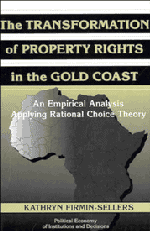 The Transformation of Property Rights in the Gold Coast
The Transformation of Property Rights in the Gold Coast Published online by Cambridge University Press: 08 January 2010
Indirect rule transferred the struggle to define property rights to the traditional state, but it did not predetermine the outcome of those struggles. The definition and enforcement of property rights in each state were instead the products of (I) the indigenous actors' competition to secure a distributionally favorable definition of property rights, and (2) the interaction between these indigenous actors and the European officials who wielded the coercive authority of the colonial state.
Part II examines the transformation of property rights systems in two traditional states of the Gold Coast Colony: the Ga state and Akyem Abuakwa. In both, indigenous actors responded to the commercialization of land by ‘reinventing tradition. ’ Individuals and groups defined customary property rights systems that gave them privileged access to and control over land; and they reformed traditional state institutions in an effort to enforce those rights. In the Ga state, the elites' endeavor failed, and customary land tenure was both fluid and insecure. In Akyem Abuakwa, however, the elites succeeded. Property rights and custom were fixed and secure.
The analysis of these divergent outcomes raises many of the central theoretical questions introduced in chapter 1. Both case studies confirm the proposition that distributional conflict lies at the core of the institution building process. In both the Ga state and Akyem Abuakwa, elites and non-elites battled one another to define a version of custom that gave them a disproportionate share of society's resources. The resolution of that conflict hinged upon the use of coercive force.
To save this book to your Kindle, first ensure [email protected] is added to your Approved Personal Document E-mail List under your Personal Document Settings on the Manage Your Content and Devices page of your Amazon account. Then enter the ‘name’ part of your Kindle email address below. Find out more about saving to your Kindle.
Note you can select to save to either the @free.kindle.com or @kindle.com variations. ‘@free.kindle.com’ emails are free but can only be saved to your device when it is connected to wi-fi. ‘@kindle.com’ emails can be delivered even when you are not connected to wi-fi, but note that service fees apply.
Find out more about the Kindle Personal Document Service.
To save content items to your account, please confirm that you agree to abide by our usage policies. If this is the first time you use this feature, you will be asked to authorise Cambridge Core to connect with your account. Find out more about saving content to Dropbox.
To save content items to your account, please confirm that you agree to abide by our usage policies. If this is the first time you use this feature, you will be asked to authorise Cambridge Core to connect with your account. Find out more about saving content to Google Drive.